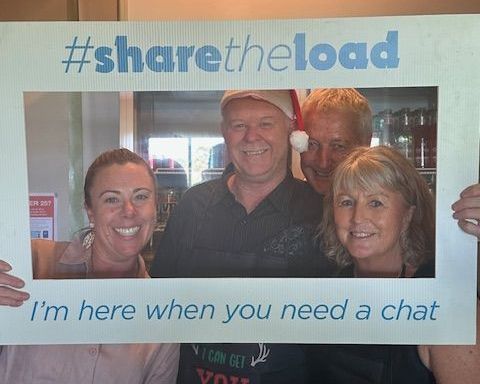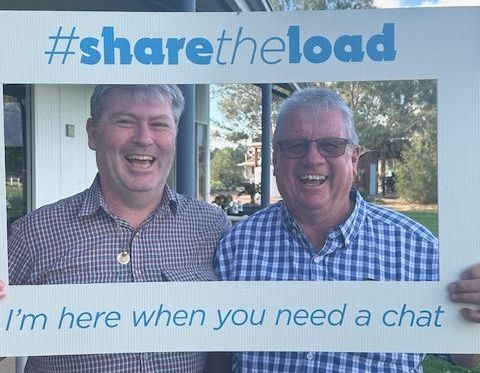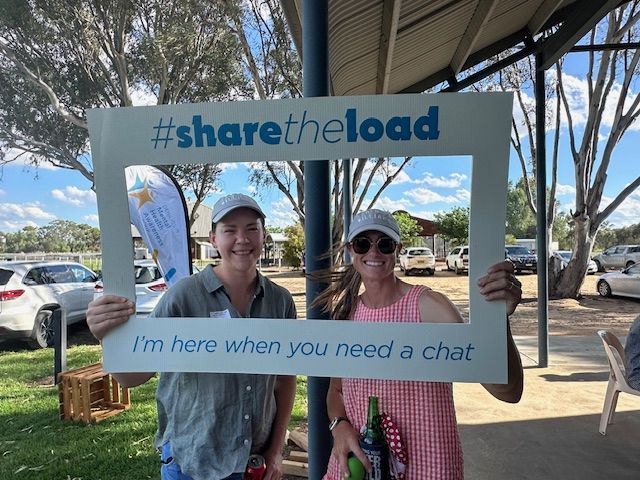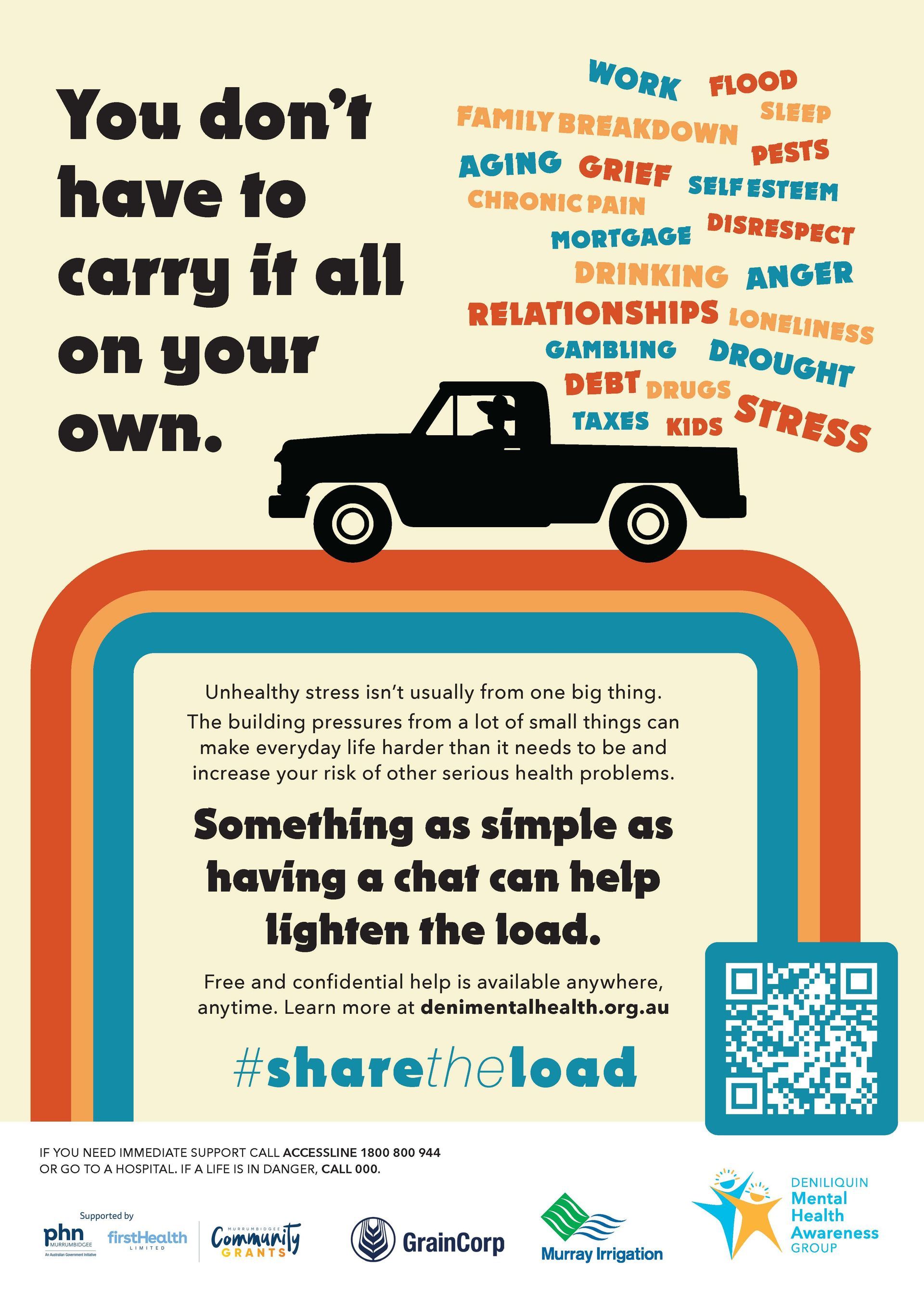Community in Focus: Deniliquin Mental Health Awareness Group

17 December 2024
New ‘landing page’ to provide mental health support for farmers
Farmers and rural communities are renowned for being ‘resilient’ which, the dictionary explains, is “being able to withstand or recover quickly from difficult conditions”.
This ‘resilience’ can become an expectation; an acceptance that a person must be ‘tough’ and able to survive adversity. However, being resilient does not mean we are immune to, or unaffected by, stress and adversity.
Lourene Liebenberg and Alison Thorne are part of the Deniliquin Mental Health Awareness Group (Deni MHAG), which has identified a need to raise awareness of specific mental health supports for farmers across the Southern Riverina region.
To ensure positive action is being taken to meet this need, Deni MHAG has developed a dedicated landing page for ‘Farmer Wellbeing’ on its website, at the following link: www.denimentalhealth.org.au/sharetheload.
The initiative has been made possible with a $1,000 grant provided by Murray Irrigation through its annual Community Sponsorship Program, which complemented other sponsorship.
Lourene explained that the landing page, which was launched in early December 2024, provides a ‘one stop’ place where information and links are available to signpost assistance and resources.
“We felt it was important to have a separate landing page, as farmers have a unique language around mental health and wellbeing, and it is not a group that seeks help easily,” she said.
“There is very much an attitude of ‘get on with it’, and a significant stigma attached to talking about mental health and help-seeking.”
Lourene acknowledges that although this is improving, it is essential there is language and concepts that resonate with farmers.
Deni MHAG is promoting the farmer specific landing page with a community campaign that revolves around the theme ‘Share the Load’.
Alison, President of Deni MHAG, said the aim of the landing page, and the broader community campaign, is to encourage farmers to “let’s talk about it”, adding this campaign goes further than just farmers, with a lot of the same services being available for truckies, tradies and blue collar workers.
“We all have mental health (like physical health) and sometimes we can get a bit bogged down by what is happening in our lives,” Alison said.
“The new landing page explains the similarities with seeking help for physical problems – basically, the same needs to happen when we are feeling low in our mental health.
“It also highlights the importance of sharing the load – if you need to, talk with someone, whether it’s a good mate, a family member, your GP or getting support from the many services out there, particularly helplines.”
Alison said it is important for everyone to understand they do not have to be in crisis before seeking help. There are many Helplines available that provide the opportunity to talk things through, and some provide follow up support.
The landing page also has information on how to listen and how to help a mate, with links to specific websites that apply to famers. These are pages like
Are You Bogged Mate?,
This Is a Conversation Starter (TIACS),
Rural Aid and
Mensline.



Deni MHAG launched the #sharetheload campaign at the Village Christmas in Conargo on December 7 2024. Pictured above is:
Left: Liz McNamara, Scott Fullerton, Alistair McNamara and Deb Stockton
Middle: Richard McDaid and Jeff Rose
Right: Sheree Allitt and Amelia Seignior
Are You Bogged Mate? is all about helping country blokes talk about mental health and suicide while spreading awareness about depression in the bush.
These online and virtual services provide vital support in rural communities. While statistics show the reported prevalence of mental illness in rural and remote Australia appears similar to that of major cities, access to face to face mental health services is substantially more limited and tragically, rates of self-harm and suicide increase with remoteness.
There are also additional barriers in rural communities, which include unhelpful attitudes and perceptions about the usefulness of interventions, privacy concerns, cost (the service, travel and other work foregone) and digital factors such as access to technology, useability and speed of connectivity.
“One fantastic service we want to make people aware of is TIACS; a free counselling service that connects farmers, tradies, truckies and blue collar workers with a free phone and text counselling service, Monday to Friday from 8am to 10pm,” Lourene said.
TIACS removes the physical and financial barriers to accessing help through a simple text and call service directly to professional counsellors.
Lourene says over the past two decades we have seen the impact of floods, droughts and uncertainty that goes with living in a regional farming community, including the ongoing issues around water and the environment.
“I am sure there will be very few people who will not agree that these issues impact the mental health of individuals, families and the wider community,” she said.
“Many factors place individuals at increased risk of developing mental health issues, and mental illness.
“We know that living with constant uncertainty about the future, particularly around things that can impact livelihood, causes persistent, ongoing stress.”

Ongoing stress is one of the biggest risk factors of depression, and for a lot of people this includes feelings of guilt, shame, helplessness and hopelessness. Many people struggle with thoughts of ‘I cannot see a way through this’, or ‘I feel like a failure’.
For some it is the overwhelming thought of having to implement significant change, even selling farms and businesses and losing what they have known all their life. This can bring about a significant sense of loss and grief, and losing a sense of connection.
“Sadly, these are also contributing factors to risk of suicide,” Lourene said.
“For those of us working in the mental health space this is a major concern when we look at our community’s risk.
“On average 3,200 deaths by suicide occur every year in Australia, of which 75 per cent are men.
“We also know living in a regional, rural or remote area puts us at higher risk of suicide.”
Lourene says many people are sick of hearing that individuals and communities are ‘resilient’, and it can lead to an assumption we are tough and will survive regardless.
“This might be true, we are tough, and most will survive; but this does not come without a toll on their health and all other aspects of their lives, including that of their families,” she said.
The key message Deni MHAG wants to highlight is that help is available for anyone struggling with their mental health, and its new landing page provides information and pathways on where and how this can be accessed.
“Counselling cannot bring more water or rain or prevent floods or droughts, but it can be helpful in finding different, more helpful ways to cope with and think about challenges,” Lourene said.
“Sometimes just sharing the load with someone can bring significant relief.”
Deni MHAG was formed in 2003 and has achieved some great outcomes from projects and partnerships in the community.
Its work is recognised both across the Murrumbidgee Local Health District and statewide as being unique in the way it designs and implements local resources and campaigns. Recently, the group was announced joint winner of the 2024 NSW Mental Health Commissioner’s Community Champion Award.
Key aims of Deni MHAG include increasing awareness and knowledge of mental illness, and mental health and wellbeing; providing network meetings and forums for service providers to stay updated on the capacity and nature of service delivery; signpost the way to help for consumers, providers and the general public; decrease stigma associated with mental health; and lobby/advocate for an increase in all mental health services and funding.

For more information on Deni MHAG and the work they are doing to increase awareness and knowledge of mental illness and mental health and wellbeing visit their website denimentalhealth.org.au.


